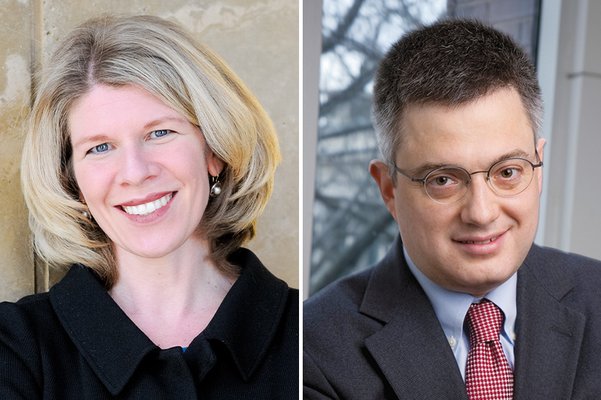ALI Designates Two Reporter’s Chairs

The American Law Institute has designated Nora Freeman Engstrom of Stanford Law School, Reporter for the Restatement of the Law Third, Torts: Concluding Provisions, as the R. Ammi Cutter Reporter’s Chair, and Henry E. Smith of Harvard Law School, Reporter for the Restatement of the Law Fourth, Property, as the A. James Casner Reporter’s Chair. Chairs are designated upon recommendation of the Director to the President of ALI.
“We are grateful to Professors Engstrom and Smith for their dedication to the Institute’s work as Reporters,” said ALI President David F. Levi upon announcing the designation during the ALI Council Meeting on March 2. “These designations are a mark of distinction and indicate our appreciation for their outstanding service.”
Nora Freeman Engstrom, R. Ammi Cutter Reporter's Chair
Established 1991 in honor of R. Ammi Cutter, associate justice of the Supreme Judicial Court of Massachusetts from 1956 to 1972 and president of ALI from 1976 to 1980, the Cutter Chair is occupied by an active Reporter of proven effectiveness for the remaining duration of the project on which the Reporter is engaged.
Engstrom serves as a Reporter for Restatement of the Law Third, Torts: Concluding Provisions. She is a nationally recognized expert in both tort law and legal ethics. Much of her work explores the day-to-day operation of the tort system and particularly the tort system’s interaction with alternative compensation mechanisms, such as no-fault automobile insurance, the Vaccine Injury Compensation Program, and workers’ compensation. Engstrom has also written extensively on trial practice, complex litigation (including MDLs), attorney advertising, alternative litigation finance, contingency fees, tort reform, and law firms she calls “settlement mills”—high-volume personal injury law practices that heavily advertise and mass-produce the resolution of claims.
Before joining Stanford’s faculty in 2009, Engstrom was a Research Dean’s Scholar at Georgetown University Law Center and an associate at Wilmer Cutler Pickering Hale and Dorr LLP. She was also a law clerk to Merrick B. Garland of the U.S. Court of Appeals for the District of Columbia Circuit and Henry H. Kennedy Jr. of the U.S. District Court for the District of Columbia. Before that, she worked at the U.S. Department of Justice, focusing on terrorism and national security issues. She graduated from Dartmouth College in 1997, summa cum laude, and from Stanford Law School in 2002, with Distinction and as a member of Order of the Coif.
Cutter was an ALI member for more than 55 years. In addition to serving as president of the Institute, he served as an Adviser to the Model Land Development Code, the Model Code of Pre-Arraignment Procedure, the Restatement Second of Property (Landlord and Tenant), the Restatement Second of Property (Donative Transfers), the Restatement Second of the Foreign Relations Law of the United States, and the Restatement Second of Conflict of Laws.
Henry E. Smith, A. James Casner Reporter’s Chair
The Casner Chair was established to honor the memory of Harvard Law School Professor A. James Casner, who, as a Reporter and Adviser for various ALI projects for over half a century, made profound contributions to the development of the law of property, the taxation of trusts and estates, and estate planning. Casner served the Institute as a Reporter over a long period of years, commencing in 1936, when he was designated a Special Reporter and a member of the Advisory Committee for portions of the original Restatement of the Law, Property.
Since 2014, Smith has served as Reporter for Restatement of the Law Fourth, Property. He is the Fessenden Professor of Law at Harvard Law School, where he directs the Project on the Foundations of Private Law. Previously, he taught at the Northwestern University School of Law and was the Fred A. Johnston Professor of Property and Environmental Law at Yale Law School. He holds an A.B. from Harvard, a Ph.D. in Linguistics from Stanford, and a J.D. from Yale. After law school he clerked for Ralph K. Winter of the U.S. Court of Appeals for the Second Circuit. Smith has written primarily on the law and economics of property and intellectual property, with a focus on how property-related institutions lower information costs and constrain strategic behavior. He teaches primarily in the areas of property, intellectual property, natural resources, remedies, and law and economics.
His books include The Oxford Introductions to U.S. Law: Property (2010, coauthored with Thomas W. Merrill), Property: Principles and Policies (3d ed., 2017, coauthored with Thomas W. Merrill), and Principles of Patent Law (7th ed., 2018, co-authored with John M. Golden, F. Scott Kieff, and Pauline Newman). He is the co-editor of The Research Handbook on the Economics of Property Law (2011, with Kenneth Ayotte), Philosophical Foundations of Property Law (2013, with James Penner), and Perspectives on Property Law (4th ed., 2014, with Robert C. Ellickson and Carol M. Rose).
